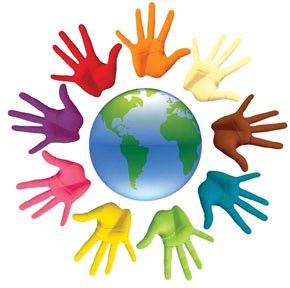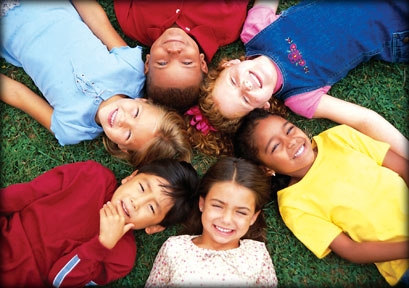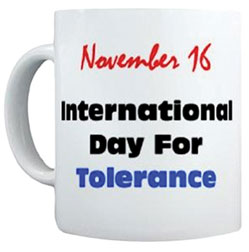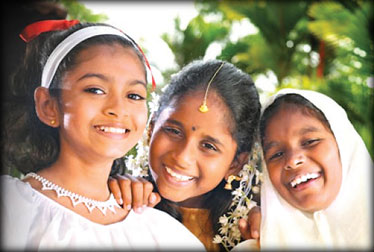 Learning to respect others - first step Learning to respect others - first step
International Day for Tolerance on November 16:
By Carol Aloysius
They were just two grade 7 students fighting their own private war in
their schoolyard. It wasn’t a fight about getting better grades or being
promoted to the next class or even winning a scholarship for needy
students. Their differences went deeper, shaped by years of ‘racist’
prejudice embedded in their minds due to the racist remarks made by
their parents, teachers and neighbours, who little realised the tragic
consequences of such careless remarks.
Devan (not his real name), a boy who hailed from the North, had just
been elected prefect of the class over his Southern classmate Gamini
(not his real name). Since the majority of the class students were from
the South, Gamini mistakenly believed that the teacher, herself a woman
who hailed from the North, had favoured the boy from the North.
When their fight reached a pitch, and the noise attracted the class
teacher, she ran into the compound. Putting herself in their middle and
taking a few blows on her body in the process, she forced the boys to
sit on the ground and calmed them. Putting an arm around each of the
boys, she then proceeded to tell them the terrible consequences of
racial violence, drawing examples from the recently concluded 30-year
battle against terrorism.
She then asked them to reflect on the lives and teachings of the
great leaders who were featured in their history books. “Learn from
them”, she said. “They taught that intolerance of any form must not be
condoned - whether racial, religious, cultural or any other
discriminating factor.”
 The boys who listened to her words of wisdom that hot afternoon some
three decades ago, are today fathers. Preferring to remain anonymous,
they told this writer, “After listening to our teacher’s advice on zero
tolerance for any kind of prejudice, we shed our differences. Between
us, we have now forged a lasting friendship which we have passed on to
the second generation and hopefully, to our future generations”. The boys who listened to her words of wisdom that hot afternoon some
three decades ago, are today fathers. Preferring to remain anonymous,
they told this writer, “After listening to our teacher’s advice on zero
tolerance for any kind of prejudice, we shed our differences. Between
us, we have now forged a lasting friendship which we have passed on to
the second generation and hopefully, to our future generations”.
Racial prejudice
Sadly, in spite of efforts to bridge such racial bigotry, by the
State and Non-Governmental Organisations, we still come across incidents
of racial prejudice among our young generation, including
schoolchildren.
To quote a recent incident; while travelling to work the other day in
a bus, I was saddened to see how a fight between two boys, one
Sinhala-speaking and the other Tamil-speaking, spilled into a racial
squabble, after the boy who had got into the bus earlier refused to give
the other student room to sit next to him, as he wanted to keep his
heavy school bag on that seat.
This resulted in a punching match with each calling the other
derogatory names that clearly had a racial bias. It was only after the
conductor threatened to throw them out of the bus that they calmed down.
November 16 (Saturday) is the International Day for Tolerance. At a
time when many nations are in danger of falling apart due to religious
and racial wars currently raging across the world, the word ‘Tolerance’
has assumed significant proportions. Conflict resolution through peace
is no longer a meaningless phrase. It is, in fact, now increasingly
being used as a tool against violence, in schools, youth clubs,
universities, churches, temples, mosques, offices and wherever the
public congregates.
In Sri Lanka, school principals are being taught lessons on conflict
resolution in the hope they train their teachers who could pass on that
message to their pupils.
 Conflict does not only arise from religious and racial differences.
It is about one’s priorities - and how one views the rights of people
around them. If those rights which we call Human Rights are trampled
upon or violated in any form, then it is a sure sign that the spirit of
intolerance has triumphed. Conflict does not only arise from religious and racial differences.
It is about one’s priorities - and how one views the rights of people
around them. If those rights which we call Human Rights are trampled
upon or violated in any form, then it is a sure sign that the spirit of
intolerance has triumphed.
Infectious diseases
These human rights can even extend to a simple thing such as banning
the head scarf that Muslim women wear in schools, as what happened in
France, which promoted Britain’s first Muslim Cabinet Minister Baroness
Warsi to say, that “to allow one to wear what they wish is the basis of
a free society.”
Stigmatising people with infectious diseases such as AIDS is also a
violation of human rights. So is prejudice against differently-abled
persons.
Intolerance thus taints every aspect of society, which calls for
specific tools and ways of countering intolerance for the world to live
in peace and people from different religions and races to co-exist.
The United Nations website cites many such interventions. They range
from overcoming racial and religious prejudice, to understanding
cultural differences, to making changes in discriminatory laws, to
giving access to education and information to all. Even issues
concerning same sex marriages have been cited as human rights issues.
As the UN Declaration states, it requires the highest authorities
such as governments to make such changes e.g. Enforcing human rights
laws, banning and punishing hate crimes and discrimination against
minorities, ensuring equal access to courts, human rights commissioners
or ombudsmen, so that people do not take justice into their own hands
and resort to violence to settle disputes.
Most importantly, it is necessary and vital that these lessons in
tolerance begin early in life - from the time a child learns to talk and
understand the world around him.
 The Declaration of Principles on Tolerance on November 16, 1995 by
UNESCO Member States affirms that, “tolerance is neither indulgence nor
indifference. It is respect and appreciation of the rich variety of our
world’s cultures, our forms of expression and ways of being human.
Tolerance recognises the universal human rights and fundamental freedoms
of others. People are naturally diverse; only tolerance can ensure the
survival of mixed communities in every region of the globe.” The Declaration of Principles on Tolerance on November 16, 1995 by
UNESCO Member States affirms that, “tolerance is neither indulgence nor
indifference. It is respect and appreciation of the rich variety of our
world’s cultures, our forms of expression and ways of being human.
Tolerance recognises the universal human rights and fundamental freedoms
of others. People are naturally diverse; only tolerance can ensure the
survival of mixed communities in every region of the globe.”
Sri Lanka is a country with a rich multicultural, multi-linguistic,
multi-racial and pluralistic society.
Already the barriers that separated the North and the East from the
South have begun crumbling with the end of 30 years of terrorism.
Tamil students from the North have been brought to Colombo while
those from the South have been taken to tour the North. Peace trains
taking loads of visitors, including schoolteachers and university
students are becoming a common phenomenon.
If we can continue breaking down the invisible walls of hate that
continue to prevent us forging the bonds of brotherhood and sisterhood,
irrespective of our faiths and races, it will not be difficult to become
‘One country One People’ as President Mahinda Rajapaksa has so often
been heard saying after the end of terrorism. |

